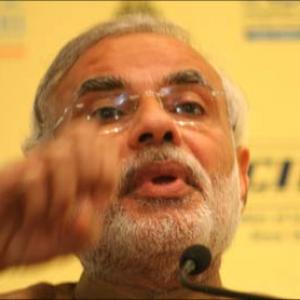Of the 11 licence holders, only eight remain in the fray as concerns about profitability and rising competition are making them think twice before jumping in.
.jpg?w=670&h=900) On Tuesday, when Tech Mahindra announced that it was dropping its plan to start a payments bank, thanks to the long payback time, it became the third licence holder, out of 11, to do so.
On Tuesday, when Tech Mahindra announced that it was dropping its plan to start a payments bank, thanks to the long payback time, it became the third licence holder, out of 11, to do so.
Last week, a consortium of Dilip Shanghvi, IDFC Bank and Telenor Financial Services had given up its plan to set up a payments bank.
In March, Cholamandalam Investment and Finance Co too had opted out.
As the launch deadline approaches, there are only eight players left to fulfil the Reserve Bank of India’s ambitious plan to start niche banks in the country.
Profitability concerns, coupled with the limited scope of business activity, are proving to be the biggest deterrent.
Those who have backed out have cited competitive pressure on the margins as the main reason. Experts believe that it will take a minimum of three to five years to break even.
“RBI’s restrictions and rules are so tough that it is difficult for a standalone payments bank to make money,” says Suresh Ganapathy, financials analyst, Macquarie Capital.
These banks are required to invest 75 per cent in government securities, which will crimp their earnings, he adds. And with the new payments solutions (Unified Payments Interface) provided by the National Payments Corporation of India, that space is going to be extremely competitive.
“So when the margins and fee structures are going to be low, how can you make money?” he asks.
The evolution in technology over the past ten months, after the licences were issued, is another reason that has forced the players to rethink their plans.
NPCI's Unified Payments System is set to completely revolutionise digital money transfer by making sending money as simple as a text message.
At the same time, competition in the digital banking space has intensified with banks entering the fray. With their captive customer base and deep pockets, they have an edge over other payments banks and digital wallet players.
“The changes in technology have been rapid. Banks have become very nimble which raises questions over the long-term consistency of the payments banks business model,” says Abizer Diwanji, head of financial services at EY. “And these players have already seen the aggression of the existing players which is only expected to intensify further.”
Competition is the key reason that prompted a rethink by Tech Mahindra.
“Unfortunately, due to the competitive pressures the margins started getting squeezed so much that we realised the payback period has become very, very long.
The question that we asked ourselves is: Is this the priority? Is this something where the capital allocation is appropriate? Or should we let this opportunity pass?,” says C P Gurnani, Managing Director and CEO of Tech Mahindra.
Inclusion is the goal
Through payments banks, RBI wants to improve financial inclusion. These banks will provide small savings accounts and payments/remittance services. They are allowed to accept deposits of up to Rs 1 lakh. However, they cannot lend or issue credit cards.
As a result, their main source of income will be fee income and not the net interest income as in the case of universal banks.
Given that in order to woo customers, payments banks may initially have to offer a higher rate compared to the 4 per cent offered by most commercial banks, their net interest margins will come under pressure.
Analysts believe that it is mainly the telecom companies that will be able to survive the heat.
The Nachiket Mor Committee on these niche banks had stated that the telecom companies that have wide reach and also have a connect with the un-banked population will be able to establish themselves quickly.
Out of the remaining eight players, three are telecom companies: Aditya Birla Nuvo, Bharti Airtel and Vodafone.
Ganapathy seconds this view. He believes that they can give extra payment options to their customers and therefore stay relevant to them.
“They are not in the payments bank business to make more money - if they don’t do it, the original mobile business will suffer. So to be competitive, they need to be in the payments solutions,” he adds.
Some of those who are still in the race say that initially a lot of players got into it without fully comprehending the business model as it was for the first time that the banking regulator had introduced niche banks into the country.
Once they realised that there was no precedence, they started to rethink their plans.
“I think the business model as envisaged would definitely have challenges in terms of their making any commercial sense of the transactions of procuring customers, having a balance, using that only for the purpose of parking in government securities, passing on incentives on payments from vendors back to the customer. The whole model must have some business proposition; then only this will be viable,” says Deloitte Partner Kalpesh Mehta.
Yet another challenge that has emerged over the past one-and-a-half years is the Pradhan Mantri Jan Dhan Yojana that was also aimed at bringing the un-banked population under the established financial system. Since its inception, banks have opened 21.87 million accounts.
Still, the payments banks remain hopeful, given that in urban areas consumers have more than one bank and therefore there is still scope to reach out to these players.
However, as experts point out, the truth is that the scope indeed has reduced considerably.
Out of the 41 who had applied for a payments bank licence, RBI gave in-principle approval only to 11.
However, questions on the profitability of these banks are not being raised for the first time.
But, as Diwanji explains, the initial excitement over niche banks was there because for the first time corporations were being allowed to get into the banking space.
But with profits looking like a distant dream, in at least the first three to five years of operations, not surprisingly, these corporations are seeing their enthusiasm slowly fade away.
WHY LICENCE HOLDERS ARE BAILING OUT
Payments banks are not allowed to lend. This will limit their earning potential
Profits will be a challenge as margins are very thin
As income channels are limited, payments banks will be under pressure to generate volume
Competition has intensified in the digital money transfer space with banks joining the race
Government initiatives aimed at the unbanked population have considerably reduced the scope of doing business for payments banks
LIST OF LICENCE HOLDERS
Reliance Industries
Aditya Birla Nuvo (Idea Cellular)
Airtel
Vodafone
Dept of Posts
FINO PayTech
National Securities Depository Ltd
Paytm (Vijay Shekhar Sharma)
Players who dropped out
Tech Mahindra
Dilip Shanghvi
Cholamandalam Investment and Finance









